Shiyuan Zuo
Semantic Communication in Dynamic Channel Scenarios: Collaborative Optimization of Dual-Pipeline Joint Source-Channel Coding and Personalized Federated Learning
Mar 18, 2025Abstract:Semantic communication is designed to tackle issues like bandwidth constraints and high latency in communication systems. However, in complex network topologies with multiple users, the enormous combinations of client data and channel state information (CSI) pose significant challenges for existing semantic communication architectures. To improve the generalization ability of semantic communication models in complex scenarios while meeting the personalized needs of each user in their local environments, we propose a novel personalized federated learning framework with dual-pipeline joint source-channel coding based on channel awareness model (PFL-DPJSCCA). Within this framework, we present a method that achieves zero optimization gap for non-convex loss functions. Experiments conducted under varying SNR distributions validate the outstanding performance of our framework across diverse datasets.
Sequential Federated Learning in Hierarchical Architecture on Non-IID Datasets
Aug 19, 2024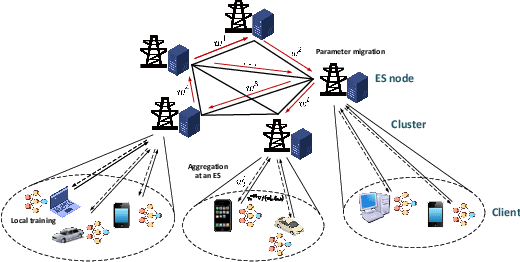


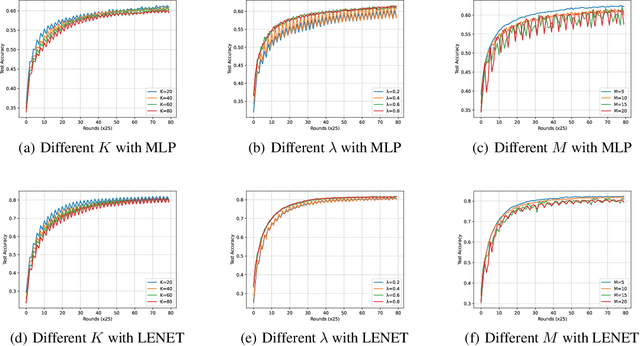
Abstract:In a real federated learning (FL) system, communication overhead for passing model parameters between the clients and the parameter server (PS) is often a bottleneck. Hierarchical federated learning (HFL) that poses multiple edge servers (ESs) between clients and the PS can partially alleviate communication pressure but still needs the aggregation of model parameters from multiple ESs at the PS. To further reduce communication overhead, we bring sequential FL (SFL) into HFL for the first time, which removes the central PS and enables the model training to be completed only through passing the global model between two adjacent ESs for each iteration, and propose a novel algorithm adaptive to such a combinational framework, referred to as Fed-CHS. Convergence results are derived for strongly convex and non-convex loss functions under various data heterogeneity setups, which show comparable convergence performance with the algorithms for HFL or SFL solely. Experimental results provide evidence of the superiority of our proposed Fed-CHS on both communication overhead saving and test accuracy over baseline methods.
Byzantine-resilient Federated Learning Employing Normalized Gradients on Non-IID Datasets
Aug 18, 2024



Abstract:In practical federated learning (FL) systems, the presence of malicious Byzantine attacks and data heterogeneity often introduces biases into the learning process. However, existing Byzantine-robust methods typically only achieve a compromise between adaptability to different loss function types (including both strongly convex and non-convex) and robustness to heterogeneous datasets, but with non-zero optimality gap. Moreover, this compromise often comes at the cost of high computational complexity for aggregation, which significantly slows down the training speed. To address this challenge, we propose a federated learning approach called Federated Normalized Gradients Algorithm (Fed-NGA). Fed-NGA simply normalizes the uploaded local gradients to be unit vectors before aggregation, achieving a time complexity of $\mathcal{O}(pM)$, where $p$ represents the dimension of model parameters and $M$ is the number of participating clients. This complexity scale achieves the best level among all the existing Byzantine-robust methods. Furthermore, through rigorous proof, we demonstrate that Fed-NGA transcends the trade-off between adaptability to loss function type and data heterogeneity and the limitation of non-zero optimality gap in existing literature. Specifically, Fed-NGA can adapt to both non-convex loss functions and non-IID datasets simultaneously, with zero optimality gap at a rate of $\mathcal{O} (1/T^{\frac{1}{2} - \delta})$, where T is the iteration number and $\delta \in (0,\frac{1}{2})$. In cases where the loss function is strongly convex, the zero optimality gap achieving rate can be improved to be linear. Experimental results provide evidence of the superiority of our proposed Fed-NGA on time complexity and convergence performance over baseline methods.
Byzantine-resilient Federated Learning With Adaptivity to Data Heterogeneity
Mar 27, 2024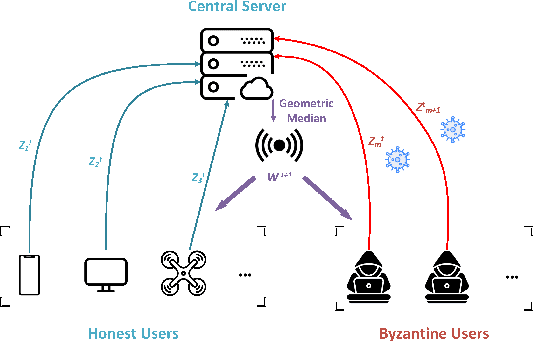
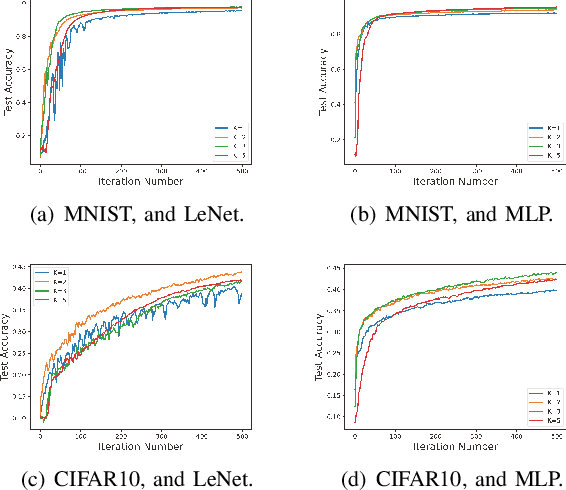
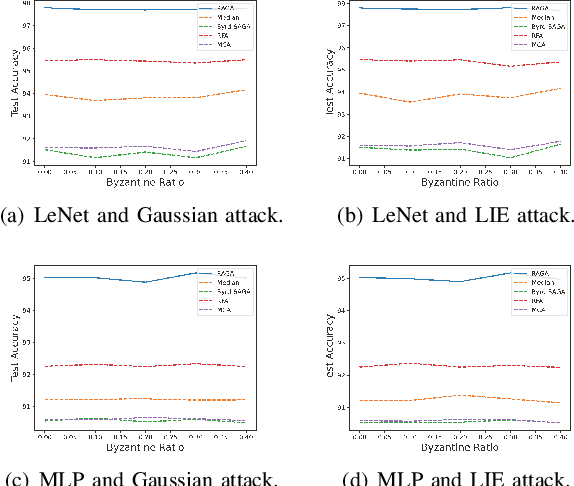
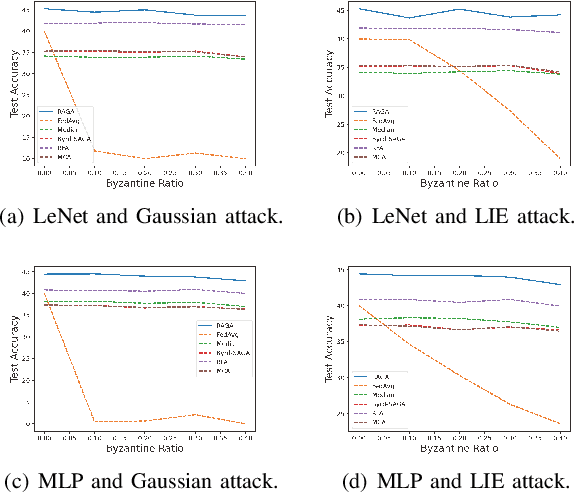
Abstract:This paper deals with federated learning (FL) in the presence of malicious Byzantine attacks and data heterogeneity. A novel Robust Average Gradient Algorithm (RAGA) is proposed, which leverages the geometric median for aggregation and can freely select the round number for local updating. Different from most existing resilient approaches, which perform convergence analysis based on strongly-convex loss function or homogeneously distributed dataset, we conduct convergence analysis for not only strongly-convex but also non-convex loss function over heterogeneous dataset. According to our theoretical analysis, as long as the fraction of dataset from malicious users is less than half, RAGA can achieve convergence at rate $\mathcal{O}({1}/{T^{2/3- \delta}})$ where $T$ is the iteration number and $\delta \in (0, 2/3)$ for non-convex loss function, and at linear rate for strongly-convex loss function. Moreover, stationary point or global optimal solution is proved to obtainable as data heterogeneity vanishes. Experimental results corroborate the robustness of RAGA to Byzantine attacks and verifies the advantage of RAGA over baselines on convergence performance under various intensity of Byzantine attacks, for heterogeneous dataset.
Over-the-Air Computation Aided Federated Learning with the Aggregation of Normalized Gradient
Sep 03, 2023


Abstract:Over-the-air computation is a communication-efficient solution for federated learning (FL). In such a system, iterative procedure is performed: Local gradient of private loss function is updated, amplified and then transmitted by every mobile device; the server receives the aggregated gradient all-at-once, generates and then broadcasts updated model parameters to every mobile device. In terms of amplification factor selection, most related works suppose the local gradient's maximal norm always happens although it actually fluctuates over iterations, which may degrade convergence performance. To circumvent this problem, we propose to turn local gradient to be normalized one before amplifying it. Under our proposed method, when the loss function is smooth, we prove our proposed method can converge to stationary point at sub-linear rate. In case of smooth and strongly convex loss function, we prove our proposed method can achieve minimal training loss at linear rate with any small positive tolerance. Moreover, a tradeoff between convergence rate and the tolerance is discovered. To speedup convergence, problems optimizing system parameters are also formulated for above two cases. Although being non-convex, optimal solution with polynomial complexity of the formulated problems are derived. Experimental results show our proposed method can outperform benchmark methods on convergence performance.
Federated Learning Robust to Byzantine Attacks: Achieving Zero Optimality Gap
Aug 21, 2023

Abstract:In this paper, we propose a robust aggregation method for federated learning (FL) that can effectively tackle malicious Byzantine attacks. At each user, model parameter is firstly updated by multiple steps, which is adjustable over iterations, and then pushed to the aggregation center directly. This decreases the number of interactions between the aggregation center and users, allows each user to set training parameter in a flexible way, and reduces computation burden compared with existing works that need to combine multiple historical model parameters. At the aggregation center, geometric median is leveraged to combine the received model parameters from each user. Rigorous proof shows that zero optimality gap is achieved by our proposed method with linear convergence, as long as the fraction of Byzantine attackers is below half. Numerical results verify the effectiveness of our proposed method.
Joint Power Control and Data Size Selection for Over-the-Air Computation Aided Federated Learning
Aug 17, 2023



Abstract:Federated learning (FL) has emerged as an appealing machine learning approach to deal with massive raw data generated at multiple mobile devices, {which needs to aggregate the training model parameter of every mobile device at one base station (BS) iteratively}. For parameter aggregating in FL, over-the-air computation is a spectrum-efficient solution, which allows all mobile devices to transmit their parameter-mapped signals concurrently to a BS. Due to heterogeneous channel fading and noise, there exists difference between the BS's received signal and its desired signal, measured as the mean-squared error (MSE). To minimize the MSE, we propose to jointly optimize the signal amplification factors at the BS and the mobile devices as well as the data size (the number of data samples involved in local training) at every mobile device. The formulated problem is challenging to solve due to its non-convexity. To find the optimal solution, with some simplification on cost function and variable replacement, which still preserves equivalence, we transform the changed problem to be a bi-level problem equivalently. For the lower-level problem, optimal solution is found by enumerating every candidate solution from the Karush-Kuhn-Tucker (KKT) condition. For the upper-level problem, the optimal solution is found by exploring its piecewise convexity. Numerical results show that our proposed method can greatly reduce the MSE and can help to improve the training performance of FL compared with benchmark methods.
 Add to Chrome
Add to Chrome Add to Firefox
Add to Firefox Add to Edge
Add to Edge